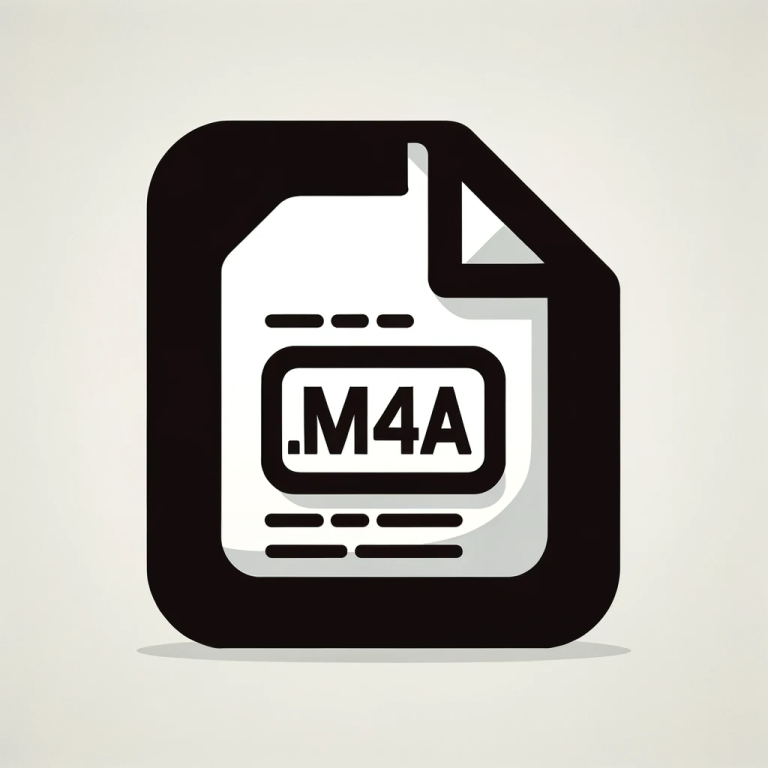.M4A File Extension

MPEG-4 Audio
| Developer | Apple |
| Popularity | |
| Category | Audio Files |
| Format | .M4A |
| Cross Platform | Update Soon |
What is an M4A file?
In the world of digital media, file extensions are like keys that unlock different types of content. One such key is the .M4A file extension, primarily associated with MPEG-4 Audio files.
.M4A files have become synonymous with high-quality audio playback and storage, often used for music, podcasts, and other audio-related content. .
We will delve into the history, technical details, advantages, disadvantages, and ways to convert and open .M4A files across various operating systems.
More Information.
The primary purpose of the MPEG-4 Audio format, denoted by the .M4A extension, was to provide a more efficient and versatile method for storing and transmitting audio data.
It aimed to address the limitations of older audio formats, such as MP3, by offering higher audio quality at lower bitrates.
This was particularly important as the internet was evolving, and people were increasingly sharing and downloading music online.
.M4A files gained popularity quickly due to their compatibility with the iTunes software, which was introduced by Apple in 2001.
iTunes used the .M4A format for encoding music files, providing users with a balance between audio quality and file size. This made it a preferred choice for music enthusiasts and content creators.
Origin Of This File.
The .M4A file extension has its roots in the larger MPEG-4 multimedia container format. The MPEG-4 format was developed by the Moving Pictures Experts Group (MPEG).
An international working group responsible for the development of multimedia standards. It was first introduced in 1998 as an advancement of its predecessor, MPEG-3.
File Structure Technical Specification.
.M4A files are based on the MPEG-4 Part 14 standard, which defines a multimedia container format. This container format can hold various types of media data, including audio, video, subtitles, and more.
When it comes to audio, .M4A files utilize different audio codecs, such as AAC (Advanced Audio Coding), ALAC (Apple Lossless Audio Codec), or even MP3 for compatibility.
One of the key advantages of .M4A files is their support for metadata. Metadata contains information about the audio file, including title, artist, album, genre, and more.
This allows for better organization and categorization of audio files, making it easier for users to manage their music libraries.
How to Convert the File?
To convert .M4A files to other formats, follow these steps on different platforms:
Online Converters:
- Visit an online converter.
- Upload your .M4A file.
- Choose the output format.
- Begin the conversion.
- Download the converted file.
VLC Media Player (Windows/Linux):
- Install VLC Media Player.
- Open VLC.
- Use “Convert/Save” option.
- Add .M4A file.
- Choose output format.
- Specify destination.
- Start conversion.
Audacity (Windows/Linux):
- Install Audacity.
- Open Audacity.
- Load .M4A file.
- Export and select format.
- Configure settings if needed.
- Save the conversion.
iTunes (macOS/Windows):
- Open iTunes.
- Set import preferences.
- Right-click .M4A file.
- Choose “Create MP3 version.”
Command Line (Advanced Users):
- Use FFmpeg with a command like
ffmpeg -i input.m4a -acodec output-format output-file.
Advantages And Disadvantages.
Advantage:
- High-Quality Audio: .M4A files offer excellent audio quality, making them suitable for storing music and other audio content.
- Metadata Support: The format allows for comprehensive metadata tagging, enhancing the user experience in music libraries and media players.
- Efficient Compression: .M4A files provide efficient compression, which means you can store high-quality audio with relatively smaller file sizes compared to some other formats.
- Wide Compatibility: .M4A files can be played on a variety of devices and media players, making them a versatile choice for audio storage.
Disadvantage:
- Compatibility with Older Devices: Some older devices and software may not support the .M4A format, which can be a limitation for users with legacy equipment.
- Lossy Compression: When using the AAC codec, .M4A files employ lossy compression, which may result in a slight loss of audio quality compared to lossless formats like FLAC or ALAC.
How to Open M4A?
Open In Windows
- Windows Media Player: .M4A files can be opened using Windows Media Player, which is included with Windows operating systems.
- VLC Media Player: Download and install VLC Media Player, a free and versatile multimedia player available for Windows, which supports .M4A files.
Open In Linux
- VLC Media Player: VLC Media Player is available for various Linux distributions and can open .M4A files.
- Audacious: Some Linux audio players like Audacious also support .M4A files.
Open In MAC
- iTunes: macOS users can use iTunes, which natively supports .M4A files. Simply double-click on the file, and it should open in iTunes.
- QuickTime Player: .M4A files can also be opened with QuickTime Player, which is included with macOS.
Open In Android
- Google Play Music: Android devices often come with Google Play Music, which can play .M4A files.
- VLC for Android: Install the VLC for Android app, which can handle various audio and video formats, including .M4A files.
Open In IOS
- Apple Music: iOS devices come with Apple Music, which natively supports .M4A files. You can open and play them directly in the Music app.
- Third-Party Apps: You can also use third-party media player apps from the App Store that support .M4A files.
Open in Others
- Cross-Platform Media Players: Media players like VLC are available on multiple operating systems, making them suitable for opening .M4A files on various platforms.
- Online Converters: In some cases, you can use online audio players and converters that support .M4A files regardless of the operating system you’re using. Upload the file to an online service, and it will provide playback or conversion options.













